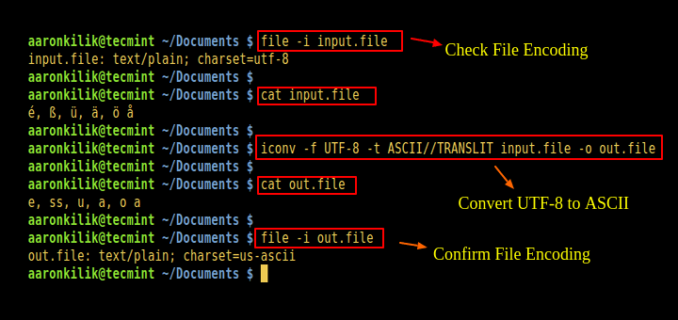Have you ever wondered how your computer is able to display characters from different languages, like emojis or other types of characters? It’s all thanks to a fascinating world called UTF-8 encoding. Whether you’re a programmer or not, understanding UTF-8 encoding is essential for enhancing your digital experience. So, fasten your seatbelts as we dive into this guide for non-programmers, and discover the incredible benefits UTF-8 encoding brings to the table. From overcoming language barriers to ensuring compatibility across systems, UTF-8 encoding opens up a whole new world of possibilities. By the end of this article, you’ll be armed with the knowledge to embrace and explore the power of UTF-8 encoding in your digital journey. Let’s get started!,
What is UTF-8 Encoding?

Source: tecmint.com
UTF-8 encoding plays a vital role in allowing computers to display characters from different languages and scripts.
However, its importance extends far beyond simply enabling us to view emojis on our screens.
By understanding and harnessing the power of UTF-8 encoding, we gain the ability to overcome language barriers and achieve compatibility across various computer systems and languages.
UTF-8 encoding revolutionizes communication by providing a standardized way of representing characters from different scripts and languages.
This means that whether you’re writing in English, Spanish, Chinese, or any other language, your computer can understand and display the characters correctly.
It ensures that messages, web pages, and documents can be shared and understood seamlessly across different platforms, devices, and software.
From overcoming language barriers to ensuring compatibility across systems, a world of possibilities opens with UTF-8 encoding online.
Embracing the power of UTF-8 encoding equips us with the knowledge to navigate a diverse and interconnected digital landscape.
Why is UTF-8 Encoding Important?
UTF-8 encoding may seem like a technical concept, but its importance extends far beyond the realm of programming.
In fact, it plays a pivotal role in our everyday digital lives, influencing how we communicate, connect, and share information online.
UTF-8 encoding is important for several reasons, especially in the context of modern software development, data storage, and communication. Here’s why UTF-8 encoding is significant:
- Universal Character Representation: UTF-8 is designed to represent a wide range of characters from various languages, scripts, and symbols. It ensures that text in any language, including less common or historic languages, can be accurately encoded and displayed.
- Multilingual Support: With UTF-8, text can be written and displayed in multiple languages within the same document, application, or web page without the need for separate encoding schemes.
- Compatibility: UTF-8 is backwards-compatible with ASCII, the basic character encoding scheme for the English language. This means that characters are encoded using a single byte in UTF-8, making it seamless to work with ASCII-encoded text within UTF-8 documents.
- Internationalization and Localization: For software applications and websites targeting a global audience, UTF-8 is crucial for supporting internationalization (designing software to adapt to various languages) and localization (adapting software for a specific language or region).
- Efficient Storage: UTF-8 is designed to optimize storage space by using variable-length encoding. Basic ASCII characters are represented in a single byte, while other characters are represented using multiple bytes. This ensures efficient use of memory and storage when dealing with multilingual content.
- Interoperability: In today’s interconnected world, systems, applications, and databases often need to communicate and share data. UTF-8 facilitates seamless data exchange by providing a common character encoding that is widely supported.
Benefits of UTF-8 Encoding for Non-Programmers

Source: spin.atomicobject.com
Certainly, UTF-8 encoding offers several benefits for non-programmers as well.
Here’s why UTF-8 encoding is important and advantageous for individuals who are not directly involved in programming:
- Multilingual Communication: Whether you’re sending emails, writing documents, or engaging on social media, UTF-8 enables you to communicate using various languages and characters, allowing you to connect with people from different parts of the world.
- Special Characters and Symbols: UTF-8 lets you easily use special characters, symbols, and emojis in your messages and documents. This adds depth and creativity to your communication, making it more engaging and expressive.
- Global Collaboration: In collaborative projects or group discussions that involve participants from different linguistic backgrounds, UTF-8 ensures that everyone can share their thoughts and ideas using their preferred language.
- Language Learning and Research: If you’re learning a new language or conducting research that involves text in multiple languages, UTF-8 encoding provides you with the ability to access, analyze, and study texts in different scripts.
- Travel and Cultural Exploration: When travelling or interacting with people from diverse cultures, you might encounter text in various languages. UTF-8 encoding allows you to understand and appreciate local signage, menus, and other written materials.
- Online Reading and Research: When reading articles, blogs, or online resources, UTF-8 ensures that you can access content in its original language, even if it’s not in English or your native language.
- Personalization and Expression: In personal correspondence, profiles, or bios, UTF-8 encoding enables you to showcase your identity and express yourself using characters and symbols that resonate with you.
How UTF-8 Encoding Enhances Your Digital Experience

Source: urlencoder.io
Additionally, embracing online UTF-8 encoding enhances your digital experience in numerous ways.
One of the key advantages is the ability to represent special characters, such as punctuation marks, mathematical symbols, and emojis.
This opens up a whole new level of expression and creativity for non-programmers.
With UTF-8 encoding, you can effectively convey meaning and emotions in your texts, making your communication more engaging and impactful.
Whether you’re sharing a heartfelt message, expressing excitement, or simply adding a touch of personality to your content, UTF-8 encoding enables you to do so effortlessly.
Moreover, this encoding method promotes accessibility and usability across different platforms and devices.
Conclusion
By understanding the fundamentals of UTF-8 encoding and recognizing its importance, you gain the ability to overcome language barriers and character limitations.
This encoding revolutionizes the way we share information and connect with others across different systems and languages.
By diving into the world of UTF-8 encoding, you unlock new ways to express yourself, connect with diverse audiences, and tap into a wealth of knowledge and creativity.
So, whether you’re a social media enthusiast, a content creator, or simply someone who craves meaningful communication in the digital world, embrace the power of UTF-8 encoding.
Start today and unlock a world of possibilities.






